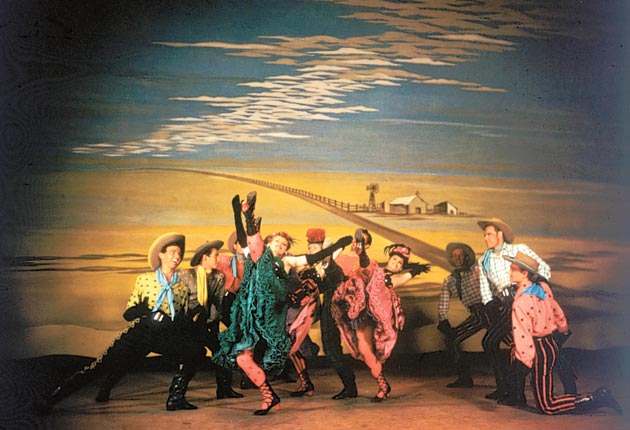David Lister: Sondheim's attack on musical legends strikes the wrong chord
The Week in Arts

One of the stages of life that Shakespeare missed out in his Seven Ages of Man is that moment when one decides that one is terribly good at one's job and everyone else is hopeless.
With some über-confident people it can happen very young; but generally it happens nearer the end of your career. Most people, happily, keep such ruminations private.
Not so Stephen Sondheim. The musical theatre composer, who remains fashionable even among those who would normally detest musicals, has written a memoir. In it, he methodically trashes the most celebrated practitioners of the art form. No great reputation is left intact.
Oscar Hammerstein – who was his mentor for goodness sake, and who, Sondheim acknowledges, "taught me virtually everything I knew about lyric writing" – has a "need to spell things out with plodding insistence". Gilbert and Sullivan "bore me to distraction... It baffles me when I hear an audience laugh at a Gilbert and Sullivan song". Noël Coward "was an intruder and covered his desperation to be part of it [the upper crust] by sneering at it... Restatement of jokes and ideas was something that Coward never shied away from." Sondheim also finds Irving Berlin's sentiments and view of the world "banal".
As for Lorenz Hart, he is afflicted, says Sondheim, by "pervasive laziness and sacrifice of meaning for rhyme. 'Your looks are unphotographable.' Unless the object of the singer's affection is a vampire, surely what Hart means is 'unphotogenic'. Only vampires are unphotographable."
No, Stephen, he didn't mean unphotogenic. He meant unphotographable. People in love can think each other so tremendous that no photograph could do them justice. When did you become so literal, let alone so catty? I wonder if it is significant that the one thing the objects of his critiques have in common is that they are all dead. Today's masters of the musical, Andrew Lloyd Webber and co, are left untouched. They, of course, could answer back.
And who would be so bold as to point out that Sondheim's musicals aren't every audience's cup of tea, particularly those audiences that like to come out humming a tune, while the people he rubbishes have inspired undying affection?
But, even if audience tastes obviously differ, there's no denying Sondheim is a master of the art form, his musicals intricate, intelligent and sometimes poignant. His scattergun demolition of the great 20th-century composers should not obliterate that fact. It's just a shame that he didn't let his work speak for itself. The world of musical theatre, however glamorous, is not really any different from any other workplace. The person who makes public his belief that he knows it all, while every other high-achieving colleague or predecessor blew it, generally convinces no one, but gets pitying glances when his back is turned.
I'm not sure that Sondheim's comments add greatly to the appreciation of the 20th-century musical. But they may yet illuminate a psychology seminar.
You only sing when you're swearing
What to do with four-letter words is a problem this and other newspapers have to wrestle with from time to time. We have sometimes gone for the boldest course, where it is necessary for the story, or cut it altogether where it is not, only occasionally resorting to asterisks. This has not been a dilemma for those in charge of opera surtitles as operas tend not to contain swear words.
That changed this week, though, when the English National Opera presented A Dog's Heart, a fairly new work based on Bulgakov's 1925 novel. In the piece the character of a dog turned into a man utters some graphic crudities. The surtitler took the asterisk way out with c**t, complete with two asterisks, up on the screen above the stage. The only problem was that you can't sing asterisks, and the singer gave us the real word loudly and lustily. So the audience was allowed to hear the word being sung with vigour but only allowed to see it in asterisk form. Why is hearing permissible, but seeing not? It felt decidedly odd.
Simon should have known better
The X Factor last weekend was devoted to Beatles songs. Wagner chose to sing "Hippy Hippy Shake" in this Beatles-themed programme. Louis Walsh, one of the judges and a supposed music industry expert, also referred to it as a Beatles song. Simon Cowell, himself, the guru of all things pop, did not demur.
"Hippy Hippy Shake" was never a Beatles song. It was not written or recorded by the group. They did sometimes perform it live and it did end up on The Beatles Live at the BBC album, a 1994 compilation of some of their BBC performances, as did numerous non-Beatles songs by Chuck Berry and others. That does not make them Beatles songs. Both Walsh and Cowell are of an age to know this sort of thing. Perhaps they are not so poptastic as they would have us believe. My faith is shattered.
Join our commenting forum
Join thought-provoking conversations, follow other Independent readers and see their replies
Comments
Bookmark popover
Removed from bookmarks